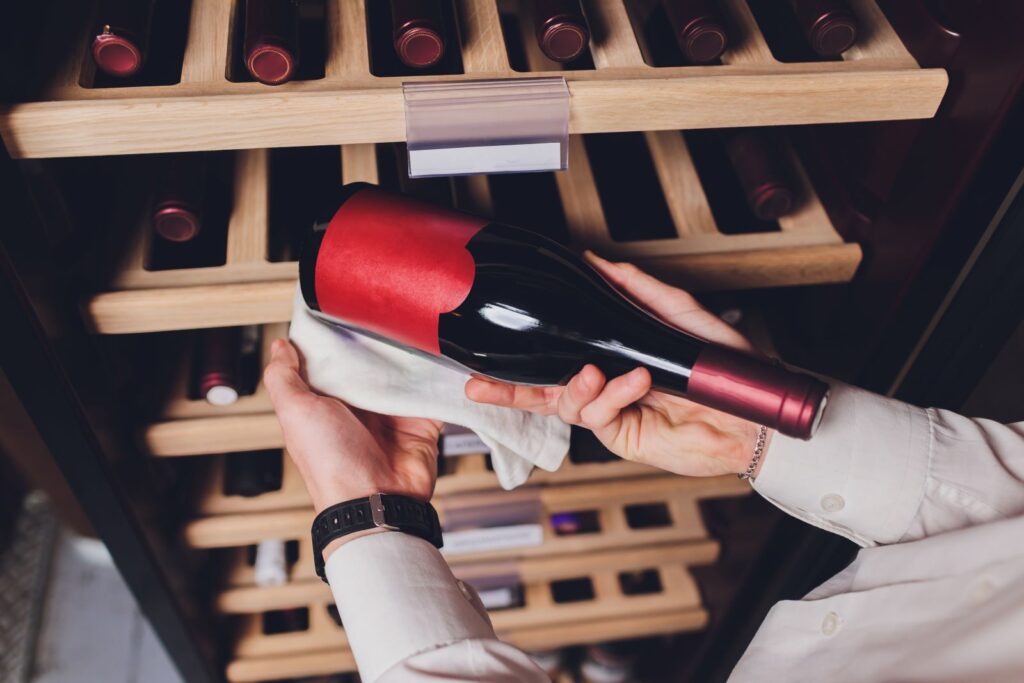“Collaborative spirit” and open-book mindset essential for future-proofing wine sector
23rd March 2023
In response to ongoing increases in dry goods, packing and supply chain costs and extreme glass shortages experienced by the wine sector, an international panel of producers, suppliers and buyers discussed new ways of working together on a zoom session hosted by The Buyer and the Wine & Spirit Trade Association.

Taking place on 15th March, the meeting, titled ‘Rewriting the Rules of Buying and Selling Wines and Spirits’, was one of three sessions set to debate key issues facing the drinks industry in the UK and abroad.
Opening the session, Sophie Jump, co-founder of The Buyer together with Richard Siddle, welcomed the audience and introduced the expert panel made up of leading players from all sectors of the supply chain.
Taking over from Ms Jump, Richard Siddle reflected on the tumultuous past 18 months that have affected everyone in the wine and spirit industry, forcing businesses large and small to deal with glass shortages, packaging issues, and cost increases at often short notice.
Introducing the first speaker, he asked Phillip Cox, co-founder of Romania’s number one export winery Cramele Recas, to give attendants an overview of some of the issues the business has been facing over the last couple of years.
Located in mid-western Romania, Mr Cox’s vineyard spans a vast 1,200 acres and produces around 30 million bottles a year, supplying 27 countries worldwide. However, the past year has been difficult for the business, with glass shortages, increases in shipping, admin and border crossing costs, and rising energy prices being the most troubling issues.
Specifically, glass bottles have more than doubled in cost, Mr Cox said, with prices often going up from one week to the next. Other items such as screw caps, corks and cartons have also multiplied in price without any prior warning.
“It’s been difficult for us to explain to customers they’re going to have a price increase they wouldn’t normally have,” he added.
To ease the burden on customers, Mr Cox adopted an open-book approach and has tried to keep price increases minimal. He considers open and honest communication a high priority, as well as giving notice about possible changes as soon as they are known.
While the crisis has impacted all players in the industry, not everyone can claim to be a victim of the situation. According to the vineyard owner, certain high-profile wineries have taken advantage of packaging and other cost increases to cover up some of their own costs, and some even had their wines delisted in Romania as a result.
At Cramele Recas, Mr Cox has been trying to save costs where possible, looking at alternative packaging to replace glass, which has been both a cost and environmental burden for the business.
A recent trial at the winery involved replacing the traditional glass option with recycled multibarrier PET bottles, which are not only cheaper and lighter than glass (50g vs. 500g), but are also produced with around 8-10 times less carbon footprint.
All things considered, Mr Cox feels optimistic about the future, and reckons prices will start coming down in summer 2023. He explained that some companies setting prices too high has resulted in customers pushing back, causing demand to be “sluggish” which will be reflected in prices further down the line.
He concluded the wine scene is stabilising and producers should expect to be in a better place in a year’s time.
“Challenge is a platform for change”
Bringing a retailer’s point of view, Dror Nativ and Cat Lomax talked about how the crisis has impacted the other end of the supply chain and the efforts they have made to improve the situation.
Firstly, Dror Nativ, wine buyer and manager at Marks & Spencer, acknowledged the difficulties of the last few years for all players in the supply chain, saying that long-term (10-20-year) supplier relationships were the number one thing that have helped the business weather the storm.
“We have been a lot more open book with our suppliers,” he explained. “Together with them, we’ve been able to have a look at where are we at with costs and where are we getting the best value for money.”
He added the business has shifted focus to availability and has been a lot more flexible with things like packaging specs and bottle types.
Like other panellists, Mr Nativ also emphasized the importance of open communication and frequent check-ins to ensure all involved are benefitting from an agreement.
Meanwhile, Cat Lomax, award-winning multiple BWS buyer at Marks & Spencer, Majestic, Waitrose & Laithwaites, said whenever there is a crisis, there are also opportunities for positive change.
She believes building resilient supplier-buyer relationships all comes down to risk management and making sure shared risks are handled collaboratively. She pointed to the various risks that have traditionally set with suppliers, such as price increases, availability and transport issues, and suggested retailers should take on a share in those risks.
“It should be a very open book discussion about the risks, costs, and challenges and how collaboratively you respond to those,” she stressed.
“It’s a complicated situation to manage and risk has to be balanced between retailer and supplier to find a way that makes everyone happy.”
Since forewarned is forearmed, Ms Lomax urged producers to share as much information as possible about harvest forecasts, shortages, producing and packaging costs, so buyers can get a clear picture of what’s going on behind the scenes.
“Having an open and honest conversation with the supplier is an absolute priority,” she said.

Soft costs such as labour and heating are also built into the price of a bottle of wine.
“Retailers need to make sure the requests for price increases are based on fact and are provable, they have to be cross-referenced with the commodities market. As a buyer, I can say that cost increases come under greater scrutiny within big retailers than they ever used to,” she added.
As to whether supplier and retailer relationships will emerge stronger as a result of challenging times, Mr Nativ confirmed he feels optimistic about the future.
“Relationships at M&S have strengthened because of tough times, we are a lot more resilient as an industry now,” he said.
Whereas, Ms Lomax believes the current times are challenging the sector to deal with the unexpected, and recommends industry players adopt a long-term view beyond this short-term crisis period.
“Honesty is the best policy”
Next up, Andrew Porton, managing director of Lanchester Group Wine Division, offered some insight into how his business responded to the industry-wide challenges.
Similar to other panellists, the primary issue facing Mr Porton has been the marked increase in glass and shipping costs, requiring the business to ask for flexibility from customers at the most challenging times.
Mr Porton highlighted all players in the supply chain are dealing with different aspects of the same problem, and the issues have been universal across the whole industry. As a result, he’s found people to be very understanding in general, since no one business has been the sole bearer of bad news.
Price increases with little to no notice have also been a compounding factor, adding to the difficulties of the past year. As for how to best manage the crisis, Mr Porton suggested the solution lies in communication.
“Honesty is the best policy, we need to discuss what exactly the problems are and what we’re going to do about them.”
To weather the storm, the business has had to widen its horizons and look at different options on a global scale. “Services that come from France, Spain and South Africa have been doing relatively well for us,” Mr Porton said, adding the business is ultimately a wine company that has product to sell and cannot afford to retain non-lucrative relationships.
Transparency, forward planning, and “collaborative spirit” are key
Joining the discussion, Kim Wilson, managing director of North South Wines, said ‘rewriting the rules’ is all about communication and looking for alternatives rather than putting all eggs in one basket.
Transparency is also really important, she said, and businesses may need to conduct daily conversations with suppliers about how to mitigate cost increases.
“A lot of what’s happening is out of our control, we just try to keep the communication up and hope for the best,” she added.
While Ms Wilson believes the rules of trade can be rewritten, she also thinks glass manufacturers need to be made aware of what the wine sector has been dealing with and that short notices are “not very collaborative”.
Meanwhile, Richard Dennis, commercial director at Watermill Wines, stressed the importance of forward planning and increasing communication within the supply chain.
“We need to be open book, we really encourage direct communication between supplier and consumer, which has helped give us a clearer picture of what’s going on.”
On a brighter note, Alex Green, who co-founded his own importer business Beyond Wines in September last year, said he’s seen positive changes in the industry as well.
“We have a two-way street now, hopefully, one day we’ll have a conversation about cost decreases,” he remarked.
From independent wine merchants Correy & Barrow, head of wine Rebecca Palmer said while the industry has dealt with these issues before, this time it’s “everything everywhere, all at once”.
“Customers need stability, consistency and continuity and we have to try and manage that and help producers optimise their businesses for that.”
Highlighting the importance of the collaborative spirit, she added: “With producers, it’s about communication, keeping each other abreast of new developments, working on forecasting, reforecasting, and stock management in order to enable us to maintain business for all.”
Ms Palmer went on to criticise companies that impose price increases at the last minute, stripping customers of notice and the chance to manage these issues. She concluded working collaboratively is about openness, transparency and prompt communication.
Last but not least, David Rowledge, owner of Alchemy Wines Ltd, offered an international perspective on dealing with glass shortages and issues around shipping and freight.
To illustrate the magnitude of shipping cost increases, he said the pre-covid cost of shipping a 40ft container to a supermarket chain on the east coast of the US was $5,500 as opposed to $17,000 at the height of the crisis.
“When you have to renegotiate 3-4 times a year, that’s exhausting,” he added.
Sharing the suspicion of other panellists, he also believes certain freight companies are taking advantage of the situation and reaping in large profit margins.
He also criticised the glass industry for its lack of loyalty, saying he’s been sourcing bottles from the same suppliers in France and Spain that are now letting the business down.
As a result, Mr Rowledge has been considering stepping away from glass towards greener and more sustainable solutions such as cans and cartons. However, he noted consumers need to be educated about alternative formats before a large-scale shift can take place.
Ecological wine packaging as the solution
Having re-joined the discussion, buyer Cat Lomax pointed out changes have already been happening on the small scale, bringing Waitrose as an example that are currently shifting all their small bottles into the can format.
What’s more, the Royal Agricultural University’s award-winning wine and social enterprise, Cotswold Hills, recently became the first vineyard to trial eco-friendly flat wine bottles, which are produced with 50% less carbon emissions than traditional glass bottles.
“The longer glass issues remain, the more change we will see in terms of what’s on the shelf,” Ms Lomax remarked.
Speaking from experience, importer Alex Green said there is a difference between what consumers say they will do and what they actually do.
“Whilst there is glass on the shelf, it’s going to be difficult to shift to alternative packaging as consumers in Britain are very stuck in their ways,” he noted.

Cotswold Hills wine bottles are made form 100% recycled PET.
Whereas, Richard Dennis added: “Retailers have a responsibility to make a conscious effort towards making new formats more accessible and making it standardised.”
Meanwhile, Rebecca Palmer suggested alternative formats should also be adopted by high-quality wines with higher price points so consumers won’t associate it with lower value.
Vineyard owner Phillip Cox also emphasized the potential in rolling out more ecological packaging formats, although he thinks they will need to look as similar to glass bottles as possible. Moreover, he reminded attendants that there are also diversification options available, such as tourism and events, that don’t require a glass supply.
With all panellists feeling positive for the future and open to collaboration, the organisers concluded the session and thanked speakers for a great cross-section of views from different sectors in the industry.
